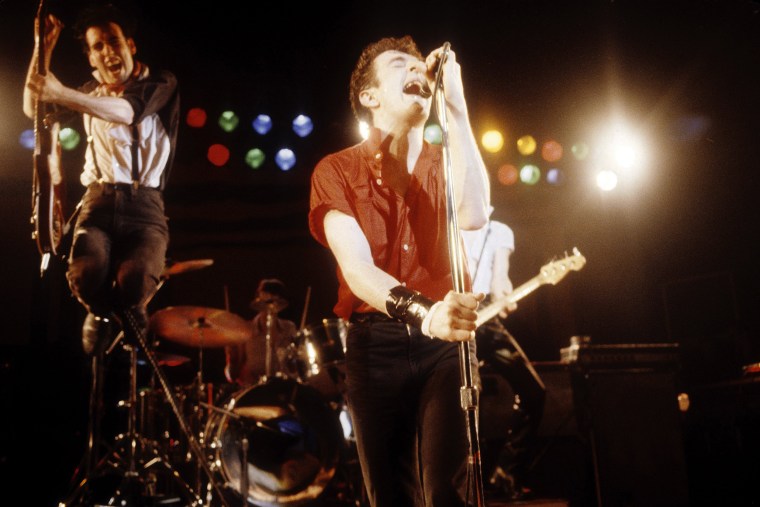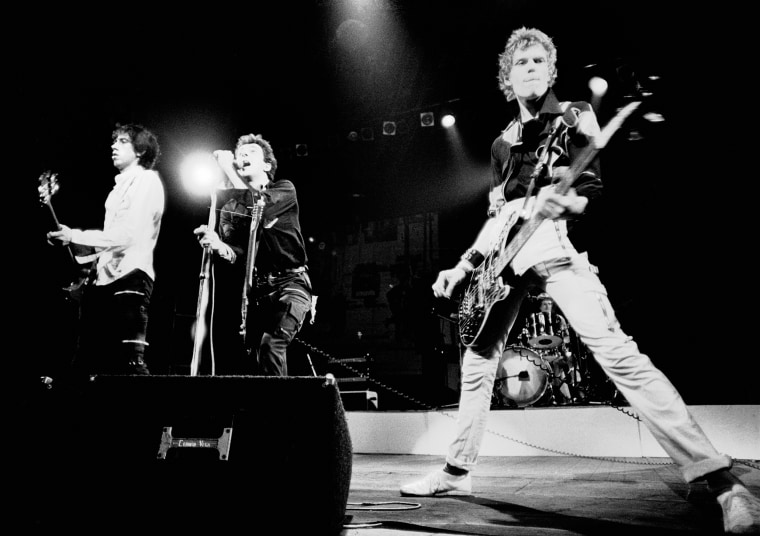“The thing is, I didn’t connect with the Clash, initially,” Public Enemy’s Chuck D confesses when we catch up to discuss Spotify’s new eight-part podcast “Stay Free: The Story of The Clash,” which the hip-hop icon narrates. “I grew up in New York in the 70s, when the Clash were a U.K. phenomenon. When they finally did reach New York, I was a 22-year-old already immersed in R&B, soul and rap.”
By the summer of 1981, however, the band’s rap homage “Magnificent Seven” and crossover hit “Radio Clash” were everywhere, says Chuck D. It was a harbinger of things to come. The Clash’s more mainstream breakthrough album “Combat Rock,” released the following year, was soon on the turntables of DJs everywhere.
“That’s when I started to pay attention,” Chuck D admits.
What he discovered was a band unafraid to take artistic chances, while reporting on the state of the world in a way that Chuck D (and a lot of other people) could relate to.
“When Public Enemy was starting up, Bill Stephney, who was integral to us signing with Def Jam, had the idea that Public Enemy could be the Clash of hip hop and rap music,” Chuck D says. Initially skeptical, the idea worked out.
SIGN UP FOR THE THINK WEEKLY NEWSLETTER HERE
The ideals shared between the two groups makes Chuck D the perfect narrator for “Stay Free,” which over the next two months will stream weekly on Spotify. The podcast aims to tell the story of the potent partnership of frontman Joe Strummer, guitarist Mick Jones bassist Paul Simonon and drummer Topper Headon, to this day referred to by their legion of fans as “the only band that matters,” more than 30 years after they disbanded.
“I think the band themselves are probably uncomfortable with that title, for obvious reasons: It’s an arrogant claim,” says Clash biographer Mark Andersen. “Of course, it didn’t come from the band, but the reason it’s still repeated today is that it wasn’t just PR hyperbole. It communicated something essential about the band; that they were more than just an entertainment enterprise.”
Indeed, the Clash were a rare breed, a band with a progressive, inclusive political message that still resonates strongly, especially in the era of Donald Trump and Brexit. The band chose artistic curiosity and authenticity, even when those principles went against their business interests.
“By the time punk came along, rock and roll was being critiqued as a sold-out enterprise, one that promised more than it could deliver,” Andersen explains. “And so, from the beginning, the Clash are a glorious paradox. They’re trying to be a superstar rock and roll band, the biggest band in the world, as Joe Strummer once said. But they’re also trying to be revolutionary. Ultimately they were both true, and that dramatic tension is part of what makes the band so interesting and so lasting in its influence.”
The Clash were a rare breed, a band with a progressive, inclusive political message that still resonates strongly.
Founded in London in 1976, in the early days of a burgeoning punk scene that also birthed the Sex Pistols, the Clash quickly outgrew the genre, soon incorporating reggae, glam, jazz, hip-hop and rap and soul into their sound.
“The music was really potent in the early days, but not many people noticed it. So they not only branched out stylistically, they became bolder and bolder in what they wrote about,” the band’s friend and Strummer biographer Chris Salewicz recalls. “For lots of fans, the Clash brought the world to them. They provided a reading list. They would get it completely wrong sometimes, but they weren’t afraid to admit that, either.”
Unlike the nihilists that made up the bulk of the bands born of the punk scenes in London, New York and Los Angeles, the Clash’s worldview was globalist. This ultimately helped burnish the view of the band’s music as timeless — and ripe for rediscovery by a whole new generation of (streaming) music fans.
“They talked about important subjects, so therefore, journalists printed what they said, which was very pointed,” Chuck D says, describing one of the core topics examined in “Stay Free.” “They could only describe the music. So they were filling up writers’ notebooks with what they were about. We took that from the Clash, because we were very similar in that regard. Public Enemy just did it 10 years later.”

Music journalism in the pre-internet age was key to the success of edgier groups like the Clash and Public Enemy, according to Chuck D.
“We learned about mythmaking from the Clash,” he says. In the U.K., where the Clash cut their teeth, and where Public Enemy first found fame, the music press treated the groups with respect, delving into their lyrics and politics at a time when their U.S. counterparts were more interested in what artists were wearing, who they were dating and their wild exploits on the road. In turn, both groups used sympathetic journalists to help develop a narrative that set themselves apart from their peers.
“Like the Clash, the story of Public Enemy was bigger than the music, at first,” Chuck D recalls.
Soon, however, the band broke through to the pop mainstream, first with its 1979 album “London Calling,” and later with the aforementioned “Combat Rock,” (1982) which led to a stadium tour with The Who.
“They struggled with how big they’d become,” says Salewicz. “They really did. At the same time, it was exactly what they wanted. And in terms of the wit of Joe Strummer’s lyrics, for example, as his worldview expanded, so did the scope and the potency of his lyrics.”
It was a lasting legacy that was built in less than a decade.
“The Clash were a band that was built with a clock ticking, like a self-destruct mechanism,” says Andersen. “But that’s part of what makes what they created so special. The paradox and contradiction built into the heart of the band suggest that they were never meant to be like, say, U2. And thank goodness. No offense to U2. But you get the sense, if you listen to the Clash’s records over the course of its lifespan, that they’re a band that is always restless, always searching, always trying to get to the next place. And that’s why their art sticks: because they made music that had depth and passion, and then they backed it up with the way they did their business.”
For Salewicz, who probably knew Joe Strummer as well as anyone, it’s easy to see why his friend’s lyrics and the band’s melting-pot of styles still resonates.
The paradox and contradiction built into the heart of the band suggest that they were never meant to be like, say, U2. And thank goodness. No offense to U2.
Chris Salewicz
“Music just isn’t as culturally relevant as it was when the Clash were active,” Salewicz explains. “It’s much more diverse, and there are grime artists that are saying stuff, but in general we are not hearing people expressing their fury at what’s going on. I don’t quite understand it. But then that’s where the Clash come in to fill that void.”
Andersen agrees, but remains uncomfortable with that “only band that matters” moniker.
“Maybe they aren’t the only band that mattered, but they were a template of something really special and new,” he says. “And it fortunately was this open-ended energy and idealism, which invited other people to participate. Because you want people to find inside themselves that unique spark that they were put on this earth to embody, and to encourage them to find the courage to live it out.”
“That’s why the Clash is so great, because it wasn’t just the voice of protest,” says Salewicz. “They kind of hit every area: Creatively, artistically, visually and with fucking great subject matter, too. So maybe it can inspire someone to become a figurehead. Because we damn well need a figurehead.”
“I think it’s key for songwriters to be faster than media,” Chuck D says, who is adamant that any budding artist use the “computer in his or her pocket” to do more than promote themselves on social media. ”There’s no reason for the news to be quicker and more hip than a song. Your computer and your smartphone are tools as well as toys. So I encourage artists to always stay awake, and stay aware. And you can get your art and your expression through the clutter of it all by just being very solid, and to the point, and trying not to look at the results, because I think metrics and analytics mess things up. They only measure more, and more is not better. Joe Strummer never worried about record sales. That was someone else’s problem. You can’t worry about that. Your job is just to create and go further.”
That’s why Chuck D is optimistic about projects like “Stay Free.” Ultimately, he says he hopes the podcast will lead to further explorations of the history of music, and in turn help inspire the next generation of politically minded artists and activists to take up where groups like the Clash and Public Enemy left off.

